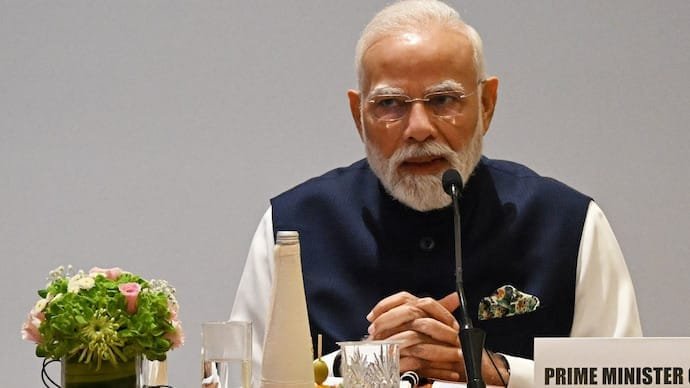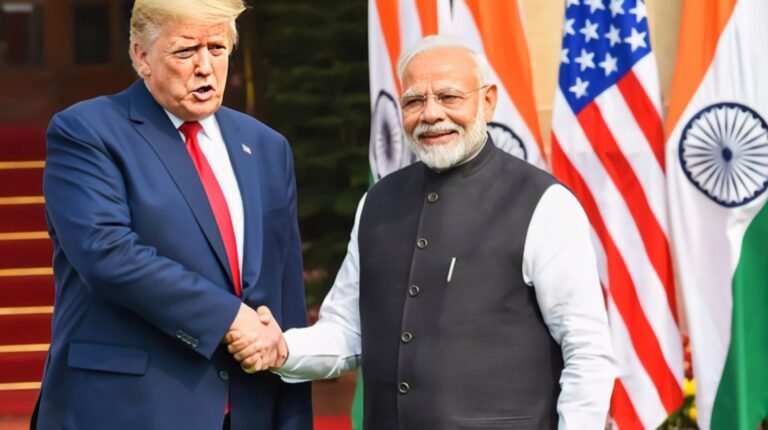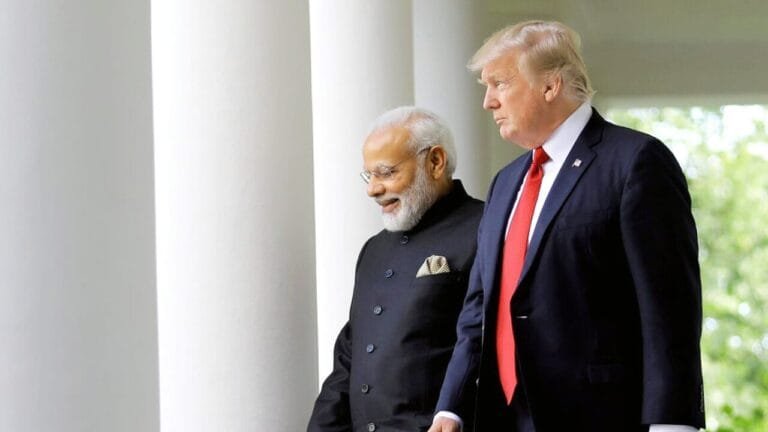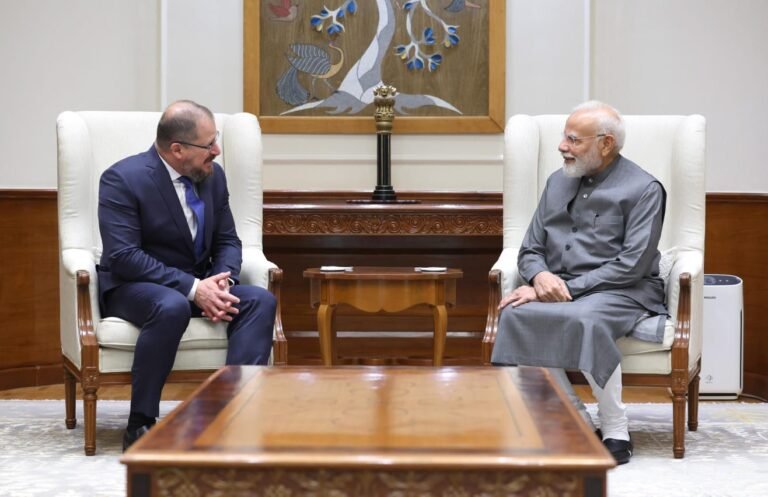
Minister Kirti Vardhan Singh represents India at the Gaza peace conference, symbolizing a balanced diplomatic stance.
Background
To understand the Gaza conflict, peace initiatives, and the current situation, it’s important to first understand the current state of the Gaza-Israel conflict and how peace efforts are progressing. Recently, mediation and conflict between Israel and Hamas escalated, leading to a massive humanitarian crisis in the affected areas.
Egypt, Qatar, the United States, and other mediators initiated discussions to de-escalate the conflict and establish a ceasefire and peace proposals. However, they later decided that Prime Minister Modi would not attend the conference, and India would instead send Minister of State Kirti Vardhan Singh as a special representative. Analysts are viewing this move from the perspective of India’s Middle East policy, its global image, and regional diplomatic balance.. This background helps us understand that this move is not simply a signal, but rather a signal and how India views its role in the game.
India’s Decision:
Reasons for Sending Kirti Vardhan Singh India’s decision—to send the Minister of State (MoS) when the Prime Minister is absent—is not merely an act of “absence,” but a deliberate strategic message. Let’s examine the reasons behind it Maintaining Representation—The Need to Not Appear Helpless India, as a major and global player, wants to maintain its role in the Middle East region and in such peace forums. If India were to abstain from attending this conference, it could send the impression that India is distancing itself from or unwilling to participate in the conflict. While the Prime Minister may not be able to attend, sending a representative indicates India’s commitment to dialogue and the peace process.
Maintaining Balance and Sensitivity
India’s foreign policy has often been based on the principles of “non-alignment” (strategic autonomy). Meaning, it seeks to maintain both dialogue and empathy, without completely choosing sides. This move will signal that India not only understands the suffering of the Palestinian side but also offers a path to peace and stability—and that it wants to play a mediator role rather than remain isolated.
Global Image and Voice of the “Global South”
India, especially in developing countries, is often considered a leader of the “Global South.” Active participation in such forums is essential to demonstrate this. This move can demonstrate globally that India does not view conflicts as mere risks or problems but rather as a country that takes initiatives toward solutions. Bilateral Relations and Middle East Importance Egypt and India have historical, economic, and diplomatic ties. Hosting Egypt could strengthen India’s relationship. Given India’s energy dependence in the Middle East and the safety of the Indian Tajik diaspora, India needs to maintain a secure and respectable role in the region. If India seriously participates in peace initiatives, it will create a positive image locally and globally.
Signals, Messages, and Symbolic Meaning
When a country participates in a peace conference, the status, statements, and behavior of the delegate sent are all important signals. In this case, the following signals may be hidden I am present, but not at the top level. The absence of the Prime Minister conveys that India may have many priorities (domestic events, other duties, etc.). However, sending a delegate indicates that India does not want to ignore the conference.
Symbolic Presence
Sending a delegate signals that India is willing to be part of the process—a “medium-impact” move. It creates the feeling that India is actively involved in the politics of the conflict, not merely a spectator. Signals Friendship and Dialogue: This move will signal India’s belief in dialogue, peace, and mediation rather than competition or acrimony. A Mixed Diplomatic Approach: India often has to balance between two opposing poles—the Israeli side and the Palestinian side. By participating in this event, India aims to demonstrate that it will adopt a holistic approach, without completely choosing any side.
Accepting a “Second Line” Role Sometimes, a country wants to convey a message by not sending its top leadership to a summit: “I am serious, but I am not prepared to attend the decision-making meeting.” This may be a strategy to maintain flexibility.. In this way, this move is a kind of diplomatic “dance move”—one in which signals, coordination, and timing are of paramount importance.
Challenges, Risks, and Limitations
Like any diplomatic move, sending a delegation also carries challenges and risks. Let’s consider them: Delegation status may be limited. If prominent leaders (presidents, prime ministers) from other countries are present, they will reduce India’s role to a “medium level”—a potential consequence of others perceiving this as a low-level voice. Limited access to the negotiating “table” may occur—top leaders may hold some decision-making meetings, excluding non-prime representatives.. Pressures and Expectations India must ensure that adequate authority and directives support Kirti Vardhan Singh’s role. If he represents a limited circle or engages in little activity, India may limit its participation in the event to a nominal one. Other countries, especially those in the Middle East, may perceive India’s role as a power sharing exercise. Strategic Opposition and Criticism
Office Hours, Logistics, and Communication Challenges
Working at the delegation level may face time and communication constraints, as other top leaders will be very busy with their own schedules. If rapport between India’s delegation and other leaders does not already exist, strengthening communication may be difficult. Uncertainty of Reaction Other countries, especially powerful players, may welcome this move or consider India’s actions baseless or undermining. If decisions are made at this conference that are inconsistent with India’s policies or foreign relations, India may face criticism upon its return. Keeping these challenges in mind, India’s foreign policy team will ensure that Kirti Vardhan Singh has adequate direction, support, and resources. Potential Outcomes and India’s Role Going Forward Below are some possible outcomes of what this move could have—and how India can enhance this role Outcomes
Boosting Bilateral Relations
India’s relationship with Egypt could deepen. Other Middle Eastern countries, especially those actively involved in peace initiatives, may view India as a respected partner. Increasing Trust in India’s Intentions in the Middle East If India plays an active, yet balanced role, India’s intentions and trust in Middle Eastern countries could increase. Specifically, India’s prospects could improve in areas such as the security of the Indian diaspora in the region, economic cooperation, and so on.
India’s Strategy Going Forward
Joint Initiatives and Alliances Sharing joint statements or proposals with other countries (especially Muslim countries, Arab countries, the OIC, and formal partners)—ensuring India’s role remains “independent and respectable.” India must consider which countries it can partner with to give its initiative greater impact. Signaling Statements and Media Strategy India must make clear statements in the media and diplomatic forums about its commitment—not merely symbolic, but a concrete role. Maintain balance in rhetoric—neither appearing biased nor insensitive.
How does this move work from the perspective of the “human mind”?
Politics and diplomacy are not just a game of policy and power, but also a game of signals, image, tactics, and psychology. This move by India combines the following psychological-strategic elements: Signaling: With this move, India sends a signal—“We are pro-dialogue, an active participant.” Balance: This move attempts to demonstrate that India is neither intransigent nor passive—it seeks a middle path. Creating a space within the competition: As regional powers assert their positions, India also needs to carve out a space where it can remain influential. Image building:
This move can be useful in building an image of “conciliator,” “reliable centrist,” etc. Timing: The timing of the conference, the level of delegates, and the words chosen—all influence psychology. Message to rival countries: This move sends a message to Israel, the United States, and Arab countries—that India is active in the region and will not simply remain in the background.
Conclusion
India’s decision—despite not sending the Prime Minister but sending Minister of State Kirti Vardhan Singh—is a deliberate diplomatic move. This move will not only demonstrate that India is part of the peace process, but if If India takes it in the right direction, gives it adequate resources and direction, and is active in the post-conference process, it could also be the beginning of a diplomatic success for India.






